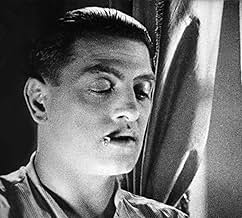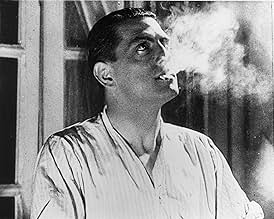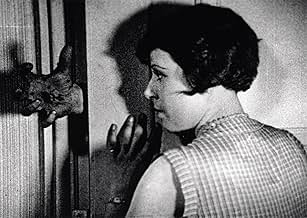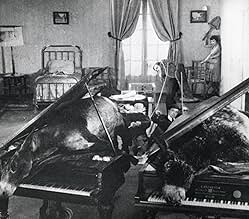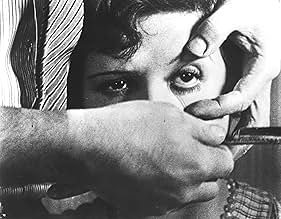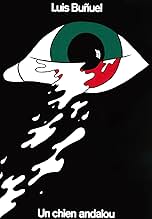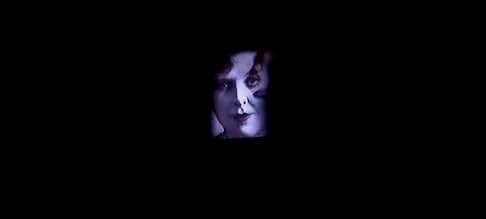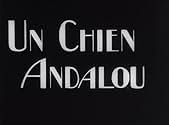AVALIAÇÃO DA IMDb
7,6/10
56 mil
SUA AVALIAÇÃO
Buñuel e Dalí exploram o inconsciente humano, numa sequência de cenas oníricas, incluindo o célebre momento em que um homem, interpretado pelo próprio diretor, corta, com uma navalha, o olho... Ler tudoBuñuel e Dalí exploram o inconsciente humano, numa sequência de cenas oníricas, incluindo o célebre momento em que um homem, interpretado pelo próprio diretor, corta, com uma navalha, o olho de uma mulher.Buñuel e Dalí exploram o inconsciente humano, numa sequência de cenas oníricas, incluindo o célebre momento em que um homem, interpretado pelo próprio diretor, corta, com uma navalha, o olho de uma mulher.
- Direção
- Roteiristas
- Artistas
Pierre Batcheff
- Man
- (as Pierre Batchef)
Simone Mareuil
- Young Girl
- (as Simonne Mareuil)
Luis Buñuel
- Man in Prologue
- (não creditado)
Pancho Cossío
- Stroller
- (não creditado)
Salvador Dalí
- Seminarist
- (não creditado)
Juan Esplandiu
- Stroller
- (não creditado)
Robert Hommet
- Young Man
- (não creditado)
Marval
- Seminarist
- (não creditado)
Fano Messan
- Hermaphrodite
- (não creditado)
Jaume Miravitlles
- Fat Seminarist
- (não creditado)
- Direção
- Roteiristas
- Elenco e equipe completos
- Produção, bilheteria e muito mais no IMDbPro
Avaliações em destaque
Luis Buñuel and Salvador Dalí's "Un Chien Andalou" (1929) is not merely a film-it is a visceral assault on logic, a 16-minute plunge into the subconscious that redefined the boundaries of cinema. Emerging from the feverish collaboration of two avant-garde titans, this short film remains a cornerstone of surrealist art, blending dreamlike absurdity with shocking imagery to challenge the very notion of narrative coherence.
The film's structure mirrors the disjointed, irrational flow of a dream, eschewing traditional storytelling for a series of jarring vignettes. From the infamous opening scene-a cloud slicing the moon as a razor slits a woman's eyeball -to ants crawling from a man's palm and rotting donkeys draped over pianos, Buñuel and Dalí weaponize Freudian symbolism to evoke primal fears and desires. The creators famously declared that their only rule was to reject any rational explanation for the film's imagery, insisting that interpretation lies solely in the realm of psychoanalysis. This deliberate ambiguity transforms the viewer into an active participant, forced to confront their own subconscious reactions.
Shot on a shoestring budget over two weeks, the film's technical audacity remains striking. Buñuel's stark black-and-white cinematography and abrupt edits amplify the surreal atmosphere, while the use of a cow's eye for the slicing scene (to avoid harming an actor) underscores the visceral realism of the grotesque.
"Un Chien Andalou" defies categorization. It is neither a story nor a manifesto but a raw, unfiltered excavation of the human psyche. As Buñuel later quipped, "Nothing in the film symbolizes anything" , yet its power lies precisely in this refusal to conform. To watch it is to surrender to chaos-to let the ants crawl, the razors slash, and the donkeys rot. Nearly a century later, it remains a testament to art's ability to unsettle, provoke, and transcend.
A landmark of surrealism, "Un Chien Andalou" is essential viewing for anyone willing to brave its unnerving beauty. Just don't expect answers-only questions, writ large in blood and celluloid.
The film's structure mirrors the disjointed, irrational flow of a dream, eschewing traditional storytelling for a series of jarring vignettes. From the infamous opening scene-a cloud slicing the moon as a razor slits a woman's eyeball -to ants crawling from a man's palm and rotting donkeys draped over pianos, Buñuel and Dalí weaponize Freudian symbolism to evoke primal fears and desires. The creators famously declared that their only rule was to reject any rational explanation for the film's imagery, insisting that interpretation lies solely in the realm of psychoanalysis. This deliberate ambiguity transforms the viewer into an active participant, forced to confront their own subconscious reactions.
Shot on a shoestring budget over two weeks, the film's technical audacity remains striking. Buñuel's stark black-and-white cinematography and abrupt edits amplify the surreal atmosphere, while the use of a cow's eye for the slicing scene (to avoid harming an actor) underscores the visceral realism of the grotesque.
"Un Chien Andalou" defies categorization. It is neither a story nor a manifesto but a raw, unfiltered excavation of the human psyche. As Buñuel later quipped, "Nothing in the film symbolizes anything" , yet its power lies precisely in this refusal to conform. To watch it is to surrender to chaos-to let the ants crawl, the razors slash, and the donkeys rot. Nearly a century later, it remains a testament to art's ability to unsettle, provoke, and transcend.
A landmark of surrealism, "Un Chien Andalou" is essential viewing for anyone willing to brave its unnerving beauty. Just don't expect answers-only questions, writ large in blood and celluloid.
I saw this recently n i am shocked at the violent content n nudity in a film made in 1929.
Candyman borrowed the scene where insects come out of a palm.
Candyman borrowed the scene where insects come out of a palm.
This famous film starts in a dream-like sequence, a woman's eye (a cow's eye was actually used) is slit open and juxtaposed with a similarly shaped cloud obscuring . After that , there take place several bizarre events such as a man has a hole in the palm from which ants emerge , it is shown literally ; later on , a man pulls a piano along with the tablets of the Ten Commandments and a dead donkey and two priests being dragged with the piano (a priest is Salvador Dalí) ; a woman pokes at a severed hand in the street with his cane (legend has it that the severed hand used in the street scene was a real hand, and Dali convinced a man to cut it off in exchange for enough money to buy lunch) , among others .
Abstract film that marked strong polemic in the epoch when it was realised , especially its sliced eyeball at the beginning , and still packs a punch even nowadays . In fact , at the Paris premiere, Luis Buñuel hid behind the screen with stones in his pockets for fear of being attacked by the confused audience . After editing the feature , Luis Buñuel and Salvador Dalí didn't know what to do with it , as an acquaintance introduced Buñuel to Man Ray, who had just finished Les Mystères du château Dé and was looking for a second film to complete the program , the two movies premiered together at the Studio Ursulines ; it made a deep impression on the Surrealist Group, who welcomed Buñuel into their ranks . The movie contains several references to Federico García Lorca and other writers of that time . The rotting donkeys are a reference to the novel "Platero y yo" by Juan Ramón Jiménez, which Luis Buñuel and Dalí hated . In 1960, a soundtrack was added to this film at the direction of Luis Buñuel , he used the same music which was played , using phonograph records , at the 1929 screenings-extracts from "Liebestod" from Richard Wagner's "Tristan and Isolde" and two Argentinian tangos.
This rare short belongs to Luis Buñuel's first period and has been voted as one of "The 25 Most Dangerous Movies" . After moving to Paris , Buñuel did a variety of film-related odd jobs , including working as an assistant to director Jean Epstein . With financial help from his mother and creative assistance from Dalí, he made his first film , this 17-minute "Un Chien Andalou" (1929), and immediately catapulted himself into film history thanks to its disturbing images and surrealist plot . The following year , sponsored by wealthy art patrons, he made his first picture , the scabrous witty and violent "Age of Gold" (1930), which mercilessly attacked the church and the middle classes, themes that would preoccupy Buñuel for the rest of his career . That career, though, seemed almost over by the mid-1930s, as he found work increasingly hard to come by and after the Spanish Civil War , where he made ¨Las Hurdes¨ , as Luis emigrated to the US where he worked for the Museum of Modern Art and as a film dubber for Warner Bros . He subsequently went on his Mexican period with "The Great Madcap" , ¨Los Olvidados¨ , ¨The brute¨, "Wuthering Heights", ¨El¨ , "The Criminal Life of Archibaldo De la Cruz" , ¨Robinson Crusoe¨ and many others . And finally his French-Spanish period with notorious as well as polemic films such as ¨Viridiana¨ , Tristana¨ , ¨The Discreet Charm of the Bourgeoisie" and his last picture , "That Obscure Object of Desire" .
Abstract film that marked strong polemic in the epoch when it was realised , especially its sliced eyeball at the beginning , and still packs a punch even nowadays . In fact , at the Paris premiere, Luis Buñuel hid behind the screen with stones in his pockets for fear of being attacked by the confused audience . After editing the feature , Luis Buñuel and Salvador Dalí didn't know what to do with it , as an acquaintance introduced Buñuel to Man Ray, who had just finished Les Mystères du château Dé and was looking for a second film to complete the program , the two movies premiered together at the Studio Ursulines ; it made a deep impression on the Surrealist Group, who welcomed Buñuel into their ranks . The movie contains several references to Federico García Lorca and other writers of that time . The rotting donkeys are a reference to the novel "Platero y yo" by Juan Ramón Jiménez, which Luis Buñuel and Dalí hated . In 1960, a soundtrack was added to this film at the direction of Luis Buñuel , he used the same music which was played , using phonograph records , at the 1929 screenings-extracts from "Liebestod" from Richard Wagner's "Tristan and Isolde" and two Argentinian tangos.
This rare short belongs to Luis Buñuel's first period and has been voted as one of "The 25 Most Dangerous Movies" . After moving to Paris , Buñuel did a variety of film-related odd jobs , including working as an assistant to director Jean Epstein . With financial help from his mother and creative assistance from Dalí, he made his first film , this 17-minute "Un Chien Andalou" (1929), and immediately catapulted himself into film history thanks to its disturbing images and surrealist plot . The following year , sponsored by wealthy art patrons, he made his first picture , the scabrous witty and violent "Age of Gold" (1930), which mercilessly attacked the church and the middle classes, themes that would preoccupy Buñuel for the rest of his career . That career, though, seemed almost over by the mid-1930s, as he found work increasingly hard to come by and after the Spanish Civil War , where he made ¨Las Hurdes¨ , as Luis emigrated to the US where he worked for the Museum of Modern Art and as a film dubber for Warner Bros . He subsequently went on his Mexican period with "The Great Madcap" , ¨Los Olvidados¨ , ¨The brute¨, "Wuthering Heights", ¨El¨ , "The Criminal Life of Archibaldo De la Cruz" , ¨Robinson Crusoe¨ and many others . And finally his French-Spanish period with notorious as well as polemic films such as ¨Viridiana¨ , Tristana¨ , ¨The Discreet Charm of the Bourgeoisie" and his last picture , "That Obscure Object of Desire" .
this movie may be dated in a certain sense, but the vitality and passion of its vicious rebellion against societal taboos and constraints still comes through full throttle. bunuel, master of cinematic/surrealist revolt, violates every boundary he can think of. a woman's eyeball is slashed open, her chest brutally groped, ants crawl out of a man's hand, etc. this is more of a curiosity than anything else, but I am a surrealism fanatic and love this along with Cocteau's "Blood of a Poet". the reviewers here who downplay it's value are simply wrong and probably decided in advance to dislike it to look different.
Good way to sample the filmography of Luis Bunuel is to begin with this surreal short. An excellent intro to Bunuel's more mature work because his films are full of bizarre images that began here. Un Chien Andalou(1929) like the rest of Bunuel's early works experiments with use of film image and surrealism. Illustrates the beginning of a career full of amazing, bizarre, and subversive films. Things could only get better for Bunuel's film career and they did.
Un Chien Andalou(1929) was an artful collaboration between two surrealistic masters in Luis Bunuel and Salvador Dali. These two artists were part of a surrealism movement in Spain that influenced the country's art. Bunuel and Dali had a fruitful but short film partnership that ended once each wanted to go their separate ways. After the early 1930s these talented artists would never work with each other again. For Un Chien Andalou(1929), Bunuel and Dali created images of eccentric force based on their day and night dreams.
Surrealism was very popular in early 20th Century art especially during the 1920s. The surrealist movement took shape in places like France and Spain where it flourished for a period of time before falling apart in 1930s. Un Chien Andalou(1929) is a good example of what made the surrealist movement tick. Salvador Dali designs images with social and symbolic meanings. Bunuel's skills as a surrealist as first shown here would become more abstract once he started mastering his craft.
Plotless short film that is basically a series of images. Un Chien Andalou(1929) is an 'Absolute Film' which relies on abstract imagery in an attempt to unnerve the viewer. In Bunuel's early films, imagery took precedent over things like dialogue and plot. In the history of cinema its a rarity especially since the beginning of the sound era for pure imagery to be the sole existence in a motion picture. Un Chien Andalou(1929) contains images that ranges from the erotic, frightening, funny, strange, and symbolic.
Bunuel's direction for Un Chien Andalou(1929) is very good considering its his first piece of cinematic work as a film director. He uses the same type of dreamlike logic here that prevails in his best films. He directs each image with unlimited imagination. Direction for Un Chien Andalou(1929) may be crude a little unsophisticated but its still fascinating to observe. Luis Bunuel first put his name among the cinematic ranks with the historical important, Un Chien Andalou(1929).
Forever immortalized on celluloid is the eye slicing image of Un Chien Andalou(1929). Cinema's fascination with eye motif probably began here and continued from then on. The destruction of sight is an important them in Un Chien Andalou(1929) and other cinematic works. Jean Vigo remarked in opinion of eye slicing image, "Is it more dreadful than the Spectacle of a cloud veiling a full moon"? Eye slicing image was influential to Italian horror espically to the films of Lucio Fulci and Mario Bava(the former did an updated version of image with eye penetration moment from Zombie Flesh Eaters[1979]).
Caused an enormous scandal in the late 1920s with depiction of disturbing and outright strange imagery. I can picture the reaction of disgust and shock on audiences faces as they watch tongue tied at the images that bombard their senses. Un Chien Andalou(1929) may have lost a little of its shock power by today's standards. Still this short film continues to retain the ability to dare which is an improbability in today's Hollywood cinema. Luis Bunuel's next film, L'Age D'Or(1930) caused an even bigger scandal and riots broke out during the film's opening show.
Not much in the way of substancial acting in a film where characters exist only as impulses and symbols. One of the most important pieces of film during first half of 20th Century cinema. Showed filmmakers that the power to provoke is as important as acting, cinemtography, dialogue, and plot. Un Chien Andalou I think is a forethought to the daring and subversive films of period covering 1967 to 1977. Un Chien Andalou(1929) I feel is the near last of a group of films concerned with film imagery that occupied the silent film genre for twenty plus years.
A motion picture ahead of its time in more ways than one. One reason its ahead of its time is the image of a woman's bare naked breasts being touched by male hands. Image such as one mentioned above was unusual for the period the film was made. Also, there are a couple of images in the film that are on the slightly gory side. Obviously done by a young Bunuel who was more sexually open minded than the older man who though an on screen kiss was obscene.
Bunuel's fetishes and Obsessions that occupied the images of Un Chien Andalou becomes maturely developed in later films. Couple of motifs from Un Chien Andalou shows up in films like Simon del Desierto(1965). Dreamlike imagery of short frequents the stories of El Angel Exterminador(1962) and Belle De Jour(1967). Its a warmup to Bunuel's next film, L'Age D'Or(1930) which is also his first feature length film. Un Chien Andalou(1929) is an exercise in artistic expression and artistic vision by an artistic genius.
Un Chien Andalou(1929) was an artful collaboration between two surrealistic masters in Luis Bunuel and Salvador Dali. These two artists were part of a surrealism movement in Spain that influenced the country's art. Bunuel and Dali had a fruitful but short film partnership that ended once each wanted to go their separate ways. After the early 1930s these talented artists would never work with each other again. For Un Chien Andalou(1929), Bunuel and Dali created images of eccentric force based on their day and night dreams.
Surrealism was very popular in early 20th Century art especially during the 1920s. The surrealist movement took shape in places like France and Spain where it flourished for a period of time before falling apart in 1930s. Un Chien Andalou(1929) is a good example of what made the surrealist movement tick. Salvador Dali designs images with social and symbolic meanings. Bunuel's skills as a surrealist as first shown here would become more abstract once he started mastering his craft.
Plotless short film that is basically a series of images. Un Chien Andalou(1929) is an 'Absolute Film' which relies on abstract imagery in an attempt to unnerve the viewer. In Bunuel's early films, imagery took precedent over things like dialogue and plot. In the history of cinema its a rarity especially since the beginning of the sound era for pure imagery to be the sole existence in a motion picture. Un Chien Andalou(1929) contains images that ranges from the erotic, frightening, funny, strange, and symbolic.
Bunuel's direction for Un Chien Andalou(1929) is very good considering its his first piece of cinematic work as a film director. He uses the same type of dreamlike logic here that prevails in his best films. He directs each image with unlimited imagination. Direction for Un Chien Andalou(1929) may be crude a little unsophisticated but its still fascinating to observe. Luis Bunuel first put his name among the cinematic ranks with the historical important, Un Chien Andalou(1929).
Forever immortalized on celluloid is the eye slicing image of Un Chien Andalou(1929). Cinema's fascination with eye motif probably began here and continued from then on. The destruction of sight is an important them in Un Chien Andalou(1929) and other cinematic works. Jean Vigo remarked in opinion of eye slicing image, "Is it more dreadful than the Spectacle of a cloud veiling a full moon"? Eye slicing image was influential to Italian horror espically to the films of Lucio Fulci and Mario Bava(the former did an updated version of image with eye penetration moment from Zombie Flesh Eaters[1979]).
Caused an enormous scandal in the late 1920s with depiction of disturbing and outright strange imagery. I can picture the reaction of disgust and shock on audiences faces as they watch tongue tied at the images that bombard their senses. Un Chien Andalou(1929) may have lost a little of its shock power by today's standards. Still this short film continues to retain the ability to dare which is an improbability in today's Hollywood cinema. Luis Bunuel's next film, L'Age D'Or(1930) caused an even bigger scandal and riots broke out during the film's opening show.
Not much in the way of substancial acting in a film where characters exist only as impulses and symbols. One of the most important pieces of film during first half of 20th Century cinema. Showed filmmakers that the power to provoke is as important as acting, cinemtography, dialogue, and plot. Un Chien Andalou I think is a forethought to the daring and subversive films of period covering 1967 to 1977. Un Chien Andalou(1929) I feel is the near last of a group of films concerned with film imagery that occupied the silent film genre for twenty plus years.
A motion picture ahead of its time in more ways than one. One reason its ahead of its time is the image of a woman's bare naked breasts being touched by male hands. Image such as one mentioned above was unusual for the period the film was made. Also, there are a couple of images in the film that are on the slightly gory side. Obviously done by a young Bunuel who was more sexually open minded than the older man who though an on screen kiss was obscene.
Bunuel's fetishes and Obsessions that occupied the images of Un Chien Andalou becomes maturely developed in later films. Couple of motifs from Un Chien Andalou shows up in films like Simon del Desierto(1965). Dreamlike imagery of short frequents the stories of El Angel Exterminador(1962) and Belle De Jour(1967). Its a warmup to Bunuel's next film, L'Age D'Or(1930) which is also his first feature length film. Un Chien Andalou(1929) is an exercise in artistic expression and artistic vision by an artistic genius.
Você sabia?
- CuriosidadesAt the Paris premiere, Luis Buñuel hid behind the screen with stones in his pockets for fear of being attacked by the confused audience. Nothing of the sort happened. In fact, the audience loved its mysterious and incomprehensible plot.
- Versões alternativasThe film was re-released in 1960 with soundtracks.
- ConexõesEdited into Avant-garde Cinema (1960)
Principais escolhas
Faça login para avaliar e ver a lista de recomendações personalizadas
Detalhes
- Tempo de duração16 minutos
- Cor
- Mixagem de som
- Proporção
- 1.33 : 1
Contribua para esta página
Sugerir uma alteração ou adicionar conteúdo ausente


